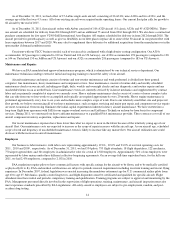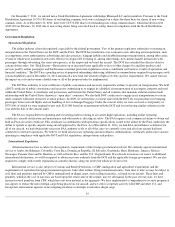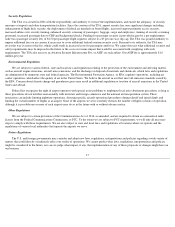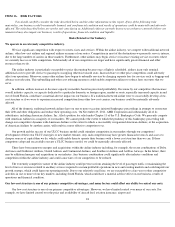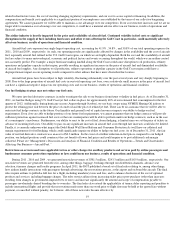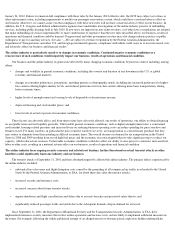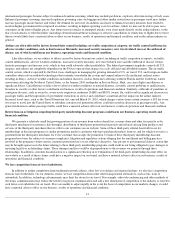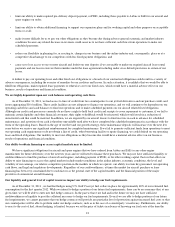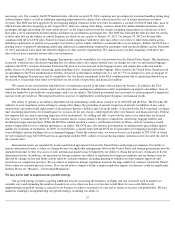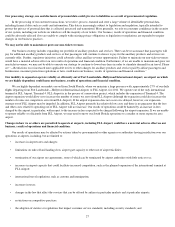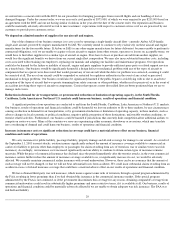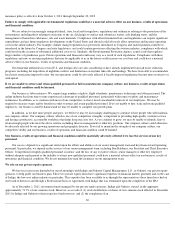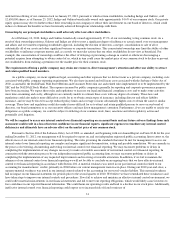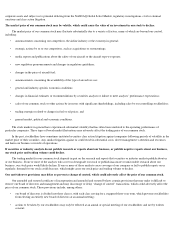Spirit Airlines 2011 Annual Report Download - page 27
Download and view the complete annual report
Please find page 27 of the 2011 Spirit Airlines annual report below. You can navigate through the pages in the report by either clicking on the pages listed below, or by using the keyword search tool below to find specific information within the annual report.
A failure to pay our operating lease and other fixed cost obligations or a breach of our contractual obligations could result in a variety of
adverse consequences, including the exercise of remedies by our creditors and lessors. In such a situation, it is unlikely that we would be able to
fulfill our obligations, make required lease payments or otherwise cover our fixed costs, which would have a material adverse effect on our
business, results of operations and financial condition.
We are highly dependent upon our cash balances and operating cash flows.
As of December 31, 2011, we had access to lines of credit from two counterparties to our jet fuel derivatives and our purchase credit card
issuer aggregating $16.6 million. These credit facilities are not adequate to finance our operations, and we will continue to be dependent on our
operating cash flows and cash balances to fund our operations and to make scheduled payments on our aircraft related fixed obligations.
Although our credit card processors currently do not have a right to hold back credit card receipts to cover repayment to customers, if we fail to
maintain certain liquidity and other financial covenants, their rights to holdback would be reinstated, which would result in a reduction of
unrestricted cash that could be material. In addition, we are required by our aircraft lessors to fund reserves in cash in advance for scheduled
maintenance, and a portion of our cash is therefore unavailable until after we have completed the scheduled maintenance in accordance with the
terms of the operating leases. Based on the age of our fleet and our growth strategy, these maintenance deposits will increase over the next few
years before we receive any significant reimbursement for completed maintenance. If we fail to generate sufficient funds from operations to meet
our operating cash requirements or do not obtain a line of credit, other borrowing facility or equity financing, we could default on our operating
lease and fixed obligations. Our inability to meet our obligations as they become due would have a material adverse effect on our business,
results of operations and financial condition.
Our ability to obtain financing or access capital markets may be limited.
We have significant obligations for aircraft and spare engines that we have ordered from Airbus and IAE (or any other engine
manufacturer for future deliveries) over the next ten years and we will need to finance these purchases. We may not have sufficient liquidity or
creditworthiness to fund the purchase of aircraft and engines, including payment of PDPs, or for other working capital. Factors that affect our
ability to raise financing or access the capital markets include market conditions in the airline industry, economic conditions, the level and
volatility of our earnings, our relative competitive position in the markets in which we operate, our ability to retain key personnel, our operating
cash flows, and legal and regulatory developments. Regardless of our creditworthiness, at times the market for aircraft purchase or lease
financing has been very constrained due to such factors as the general state of the capital markets and the financial position of the major
providers of commercial aircraft financing.
Our liquidity and general level of capital resources impact our ability to hedge our fuel requirements.
As of December 31, 2011 , we had fuel hedges using U.S. Gulf Coast jet fuel collars in place for approximately 40% of our estimated fuel
consumption for the first quarter 2012. While we intend to hedge a portion of our future fuel requirements, there can be no assurance that, at any
given time, we will be able to enter into fuel hedge contracts. In the past we have not had and in the future we may not have sufficient
creditworthiness or liquidity to post the collateral necessary to hedge our fuel requirements. Even if we are able to hedge portions of our future
fuel requirements, we cannot guarantee that our hedge contracts will provide any particular level of protection against increased fuel costs or that
our counterparties will be able to perform under our hedge contracts, such as in the case of a counterparty’s insolvency. Furthermore, our ability
to react to the cost of fuel, absent hedging, is limited, because we set the price of tickets in advance of knowing our fuel costs at the time the
23
• limit our ability to make required pre-delivery deposit payment, or PDPs, including those payable to Airbus or IAE for our aircraft and
spare engines on order;
• limit our ability to obtain additional financing to support our expansion plans and for working capital and other purposes on acceptable
terms or at all;
• make it more difficult for us to pay our other obligations as they become due during adverse general economic and market industry
conditions because any related decrease in revenues could cause us to not have sufficient cash flows from operations to make our
scheduled payments;
• reduce our flexibility in planning for, or reacting to, changes in our business and the airline industry and, consequently, place us at a
competitive disadvantage to our competitors with less fixed payment obligations; and
• cause us to lose access to one or more aircraft and forfeit our rent deposits if we are unable to make our required aircraft lease rental
payments and our lessors exercise their remedies under the lease agreement including under cross default provisions in certain of our
leases.


